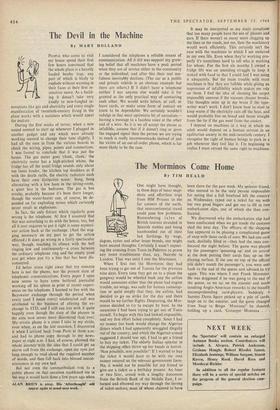The Devil in the Machine
By MARY HOLLAND During the first weeks of terror, when a new sound seemed to start up whenever I plugged in another gadget and any which were already working seemed to change their tune slightly, I had all the men in from the various boards to check the wiring, pipes, points and connections. I was forced to conclude that it was just the house. The gas meter goes 'clunk, clunk,' the electricity meter has a high-pitched whine, the fridge has all the usual fridge sounds only about ten times louder, the kitchen tap shudders as if with the death rattle, the electric radiators each have their own distinctive noise: bang, bang alternating with a low hum in the sitting-room, a quiet hiss in the bedroom. The gas is less erratic, probably because it's been there longer, though the water-heater can, of course, be de- pended on for exploding noises which curiously never result in explosions.
In fact, the only fixture which regularly goes wrong is the telephone. At first I assumed that this was something to do with the house, too, but all it ever requires to put it right is some mysteri- ous action back at the exchange. (And the nag- ging necessary on my part to get the action effected.) It does go wrong in a fairly spectacular way, though, reaching its climax with the bell ringing low and continuously—a cross between the ordinary telephone ring and the empty yowl you get when you try a line that has been dis- connected.
I'd better stress right away that my concern here is not the phone, nor the present state of telephonic communications. Every paper I open now seems to have some battered journalist working off his spleen in print at recent experi- ences on the telephone. I learned to live with the Bayswater exchange through the period when every (and I mean every) misdirected call was attributed to the business of altering the ex- change to STD, and I still can live with it quite happily even though the state of the phones in the area now seems more disordered than ever. My erratic phone is a cross I take in my stride, even when, as on the last occasion, I discovered it when I arrived back from Paris at three a.m. and had to phone copy through to my news- paper at eight a.m. I had, of course, planned the whole journey with the idea that I could get an alarm call from the exchange, open my eyes just long enough to read aloud the required number of words, and then fall back into blessed uncon- sciousness in my own bed.
But not even the somnambulant trek to a public phone on that occasion maddened me in the way it would have done a few years ago when
ALAN BRIEN is away. His 'Afterthought' will appear again as-usual next week. I considered the telephone a reliable means of communication. All it did was support my grow- ing belief that all machines have a peak period when they are of service either to the community or the individual, and after this their real use- fulness inevitably declines. (The car as a public and private vehicle is an obvious example but there are others.) If I didn't have a telephone neither I nor anyone else would take it for granted as the only practical way of contacting each other. We would write letters, or call, or leave cards, or make some form of contact we knew to be dependable. We certainly wouldn't indulge in that most optimistic bit of unrealism- leaving a message to a faceless voice at the other end of a wire. As it is we all accept the phone as infallible, assume that if it doesn't ring or gives the engaged signal then the person we are trying to reach is really incommunicado instead of just the victim of an out-of-order phone, which is far more likely to be the case. It may be interpreted as my main complaint that too many people have the use of phones and cars. If there weren't so many users clogging up the lines or the roads, just me, then the machinery would work efficiently. This certainly isn't the case with the machines to which I am enslaved in my own life. Even when they're working pro- perly it's sometimes hard to tell who is working for whom. For the first six months I owned a fridge life was an unending struggle to keep it stoked with food so that I could feel I was using it adequately. But the main trouble with most machines is that they are fallible while giving an impression of infallibility which makes me rely on them. 1 find the idea of cleaning the carpet impossibly onerous if the vacuum cleaner breaks. The thoughts seize up in my brain if the type- writer won't work. I don't know how to start to keep warm if the electricity cuts off the heat, and would probably live on bread and beans straight from the tin if the gas went from the cooker.
I depend on machines in a way in which no adult would depend on a human servant in an egalitarian society in the mid-twentieth century. .I recognise the right of human beings to pack in a job whenever they feel like it. I'm beginning to realise I must extend the same right to machines.




























 Previous page
Previous page